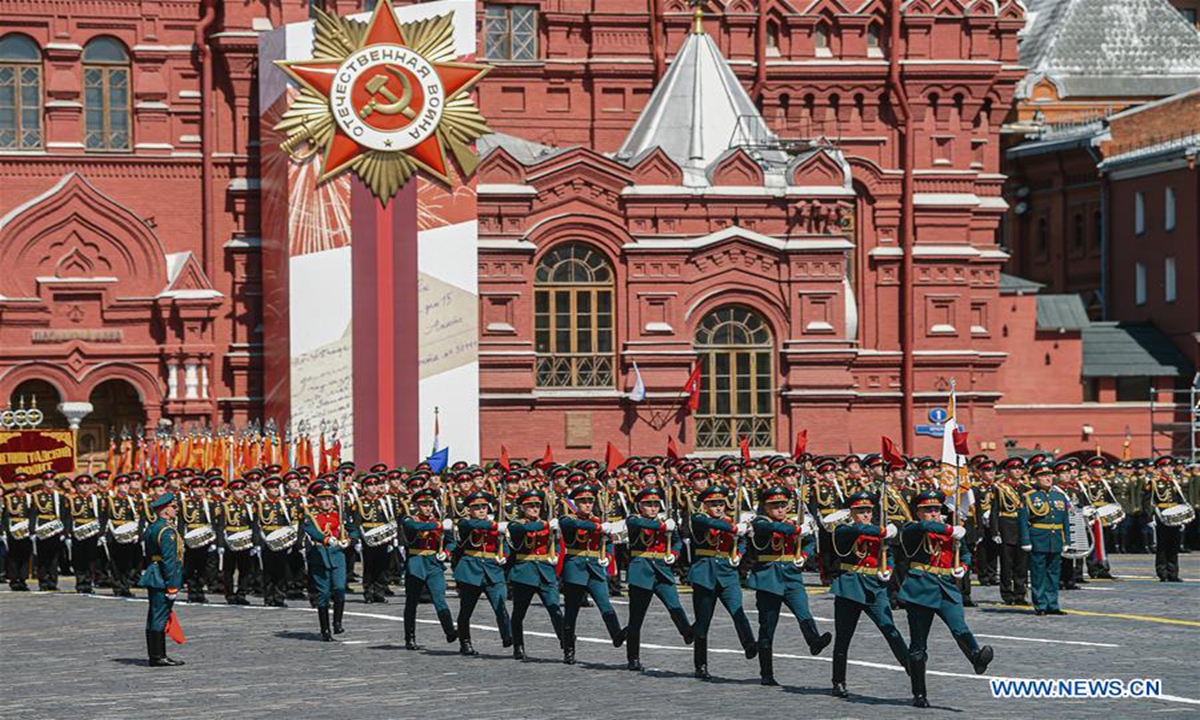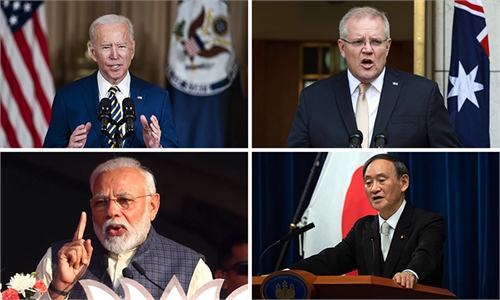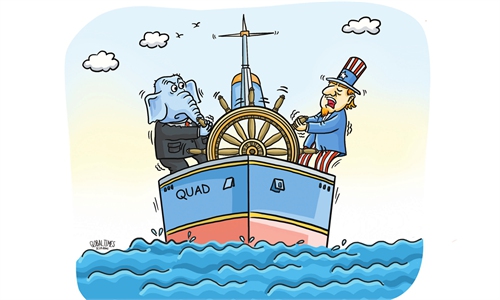
Russian national honour guard soldiers march during the military parade marking the 75th anniversary of the victory in the Great Patriotic War on Red Square in Moscow, Russia, on June 24, 2020. Photo: Xinhua
Shortly after the China-US talks in Alaska, Russian Foreign Minister Sergei Lavrov kicked off his visit to China Monday. Such an arrangement has further highlighted the China-Russia comprehensive strategic partnership of coordination for a new era. As the Biden administration's policies on China and Russia are becoming clearer, and as the international situation is still complicated, it is necessary and important for China and Russia to strengthen communication and maintain close coordination.The year 2021 marks the 20th anniversary of the Treaty of Good-Neighborliness and Friendly Cooperation between China and Russia, which laid the foundation for the two countries' relationship and pointed the direction of its development. As the world has changed and the two countries have developed, some new content should be introduced into the treaty.
China and Russia have agreed to renew the treaty and make it more relevant to the new era. The breadth and depth of the two countries' pragmatic cooperation will be increased, with their political mutual trust enhanced and mutual support strengthened. The two countries will also improve cooperation on global governance and strategic coordination on the international stage. As Chinese State Councilor and Foreign Minister Wang Yi said, "This is a milestone in China-Russia relations and, more importantly, a new starting point."
Russia is an influential major power in the region. When the US put forward its Indo-Pacific Strategy, Washington targeted not only Beijing, but also Moscow. As early as December 1998, then Russian prime minister Yevgeny Primakov expressed hope that Russia, China and India could establish a "strategic triangle" that would be in the interests of peace and security.
Currently, though China and India have undergone twists and turns in their relations due to border tensions, Russia still hopes that Beijing and New Delhi won't engage in bigger problems. Russia has actually played an active role between China and India. In other words, Russia has maintained relatively close ties with India, which has thereupon become a counterbalance to the so-called Quad group of the US, Japan, India and Australia.
Russia and India have a "Special and Privileged Strategic Partnership." Though the US is sparing no efforts to rope in India, Washington cannot avoid or ignore the factors of Russia-India relations. During US Defense Secretary Lloyd Austin's three-day visit to India from Friday, he did not specifically talk about China, but he did not hesitate to mention Russia. However, India will not destroy its relations with Russia just because it wants to seek courtship with the US to deal with China.
From this perspective, if Russia-India relations continue in a stable way, they will to some extent restrain India-US ties from further deepening. India needs the help of the US to deal with China, but India also needs Russia's support in regional organizations such as the Shanghai Cooperation Organization and BRICS.
The Quad is not as solid as iron, with the respective calculations of the four countries that are loosely knit. In addition to Russia-India ties, Russia-Japan relations will to some extent become a destabilizing factor for Quad.
Disputes between Russia and Japan over the Southern Kuril Islands, or the Northern Territories as they are called in Japan, have existed for a long time. Moscow will not easily make concessions over the sovereignty of the islands, but Tokyo still hopes to loosen Russia's position on territorial issues by expanding economic cooperation with Russia and other means. Therefore, even if Japan cannot reach an agreement with Russia on territorial disputes, taking into account its own security in the north, Japan will not recklessly stiffen its relations with Russia.
Besides, when former prime minister Shinzo Abe was in office, Japan once thought about uniting with Russia to counter China. Although the possibility for Japan to realize such a goal is tiny, such thinking reflects that Japan is expecting something from Russia. This being the case, it is possible that Russia can exert a certain influence on Japan over some China-related topics.
To sum up, generally, Russia should not be ignored regarding its capabilities to offset the influence of Quad.
The author is a senior research fellow in the Institute of Russia, Eastern European and Central Asian Studies at the Chinese Academy of Social Sciences. opinion@globaltimes.com.cn


